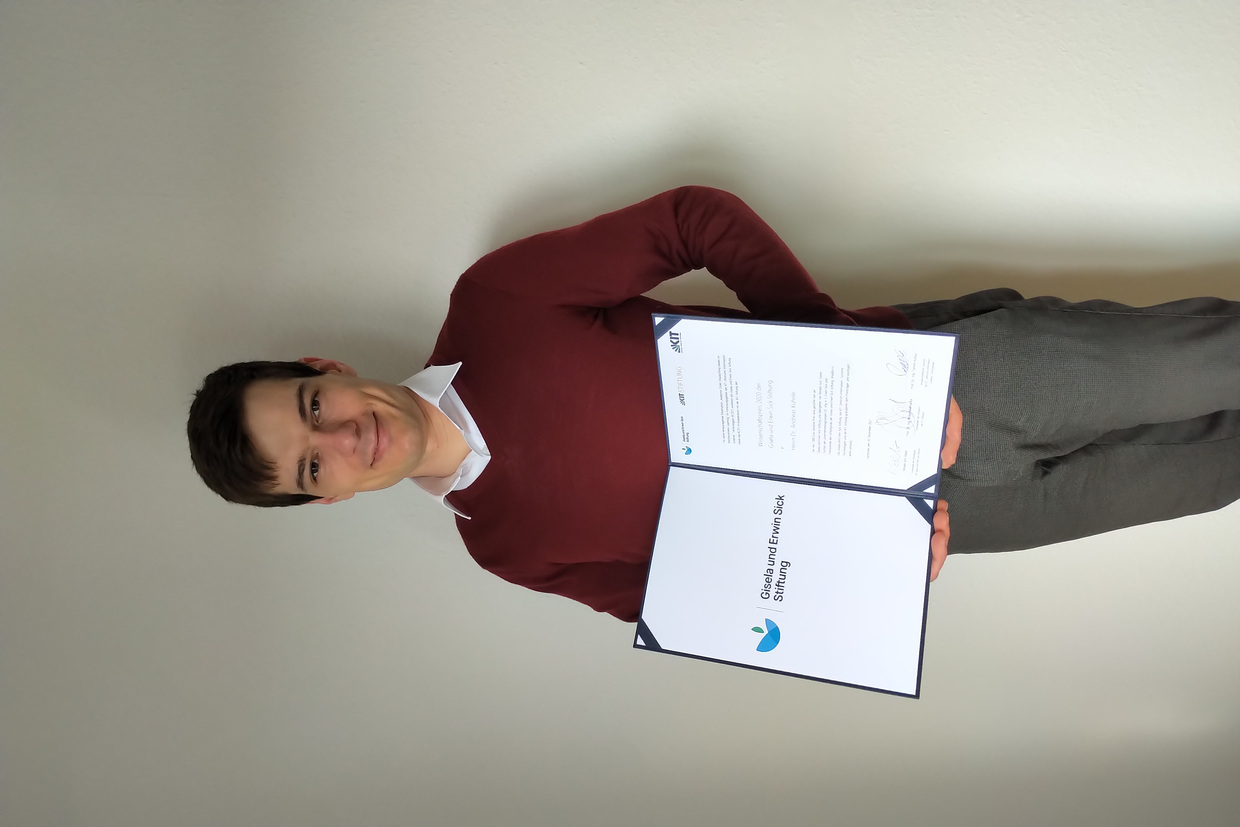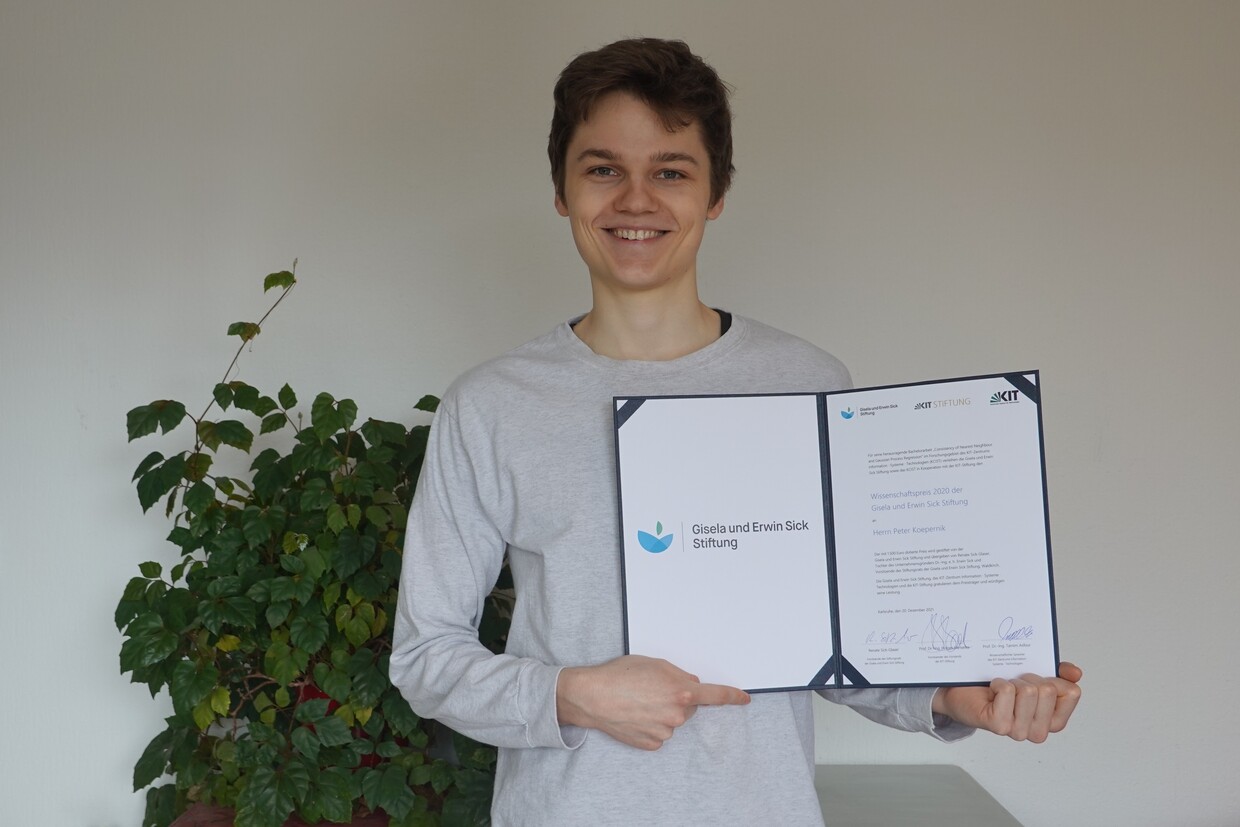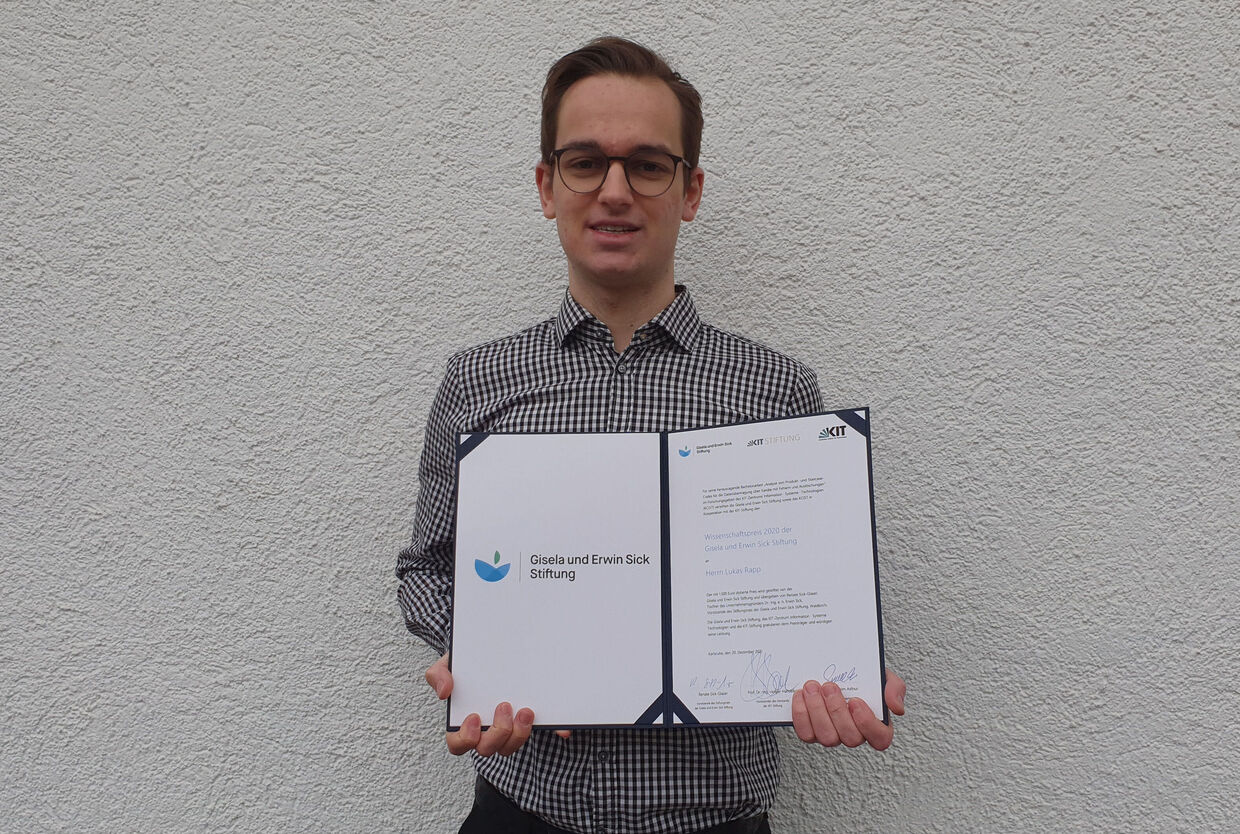The Science Award of the Gisela and Erwin Sick Foundation, honours both fundamental and application-oriented research in the KCIST research area. The prize for the best dissertation is endowed with € 7,000, the best bachelor or master thesis with € 3,000. Both prizes are awarded yearly by KCIST in cooperation with the KIT-Stiftung.
We are proud to announce this year's winners. This time two winners shared the prize for the best final thesis in 2020:
| Best Dissertation 2020 | Dr. Andreas Kuhnle | "Adaptive Order Dispatching based on Reinforcement Learning" |
| Best Thesis 2020 | Peter Koepernik | "Consistency of Nearest Neighbour and Gaussian Process Regression" |
| Best Thesis 2020 | Lukas Rapp | "Analyse von Produkt- und Staircase-Codes für die Datenübertragung über Kanäle mit Fehlern und Auslöschungen" |
Congratulations to the winners, and many thanks to all others for their participation.
About the winners and their theses
Dr. Andreas Kuhnle, Dissertation „Adaptive Order Dispatching based on Reinforcement Learning“, Fakultät für Maschinenbau, Advisor: Prof. Dr.-Ing. Gisela Lanza, Institut für Produktionstechnik (wbk).
Short abstract:
Driven by market requirements, production systems tend toward smaller batch sizes and higher product variety, thus challenging existing control methods. In the course of digitalization, learning algorithms (e.g. reinforcement learning, RL) offer a new approach to optimization. However, in the field of production control, only a few authors have addressed them so far. Motivated by the challenges of complex semiconductor manufacturing, Dr. Kuhnle's work fills this research gap. The work investigates RL modeling in terms of state, action, and reward function in very comprehensive experiments. The results are analyzed using real semiconductor manufacturing scenarios and show that RL can autonomously learn control strategies and outperform established benchmarks. Thus, the work represents a significant contribution towards self-optimizing autonomous production systems. Furthermore, the work shows that (production) engineers need to consider the potential of data-based learning techniques for their application in order to remain competitive in terms of flexibility in a world that faces new challenges at an ever faster pace.
Peter Koepernik, Bachelor Thesis „Consistency of Nearest Neighbour and Gaussian Process Regression“, Fakultät für Informatik, Advisor: Prof. Dr.-Ing. Uwe D. Hanebeck, Intelligent Sensor-Actuator-Systems (ISAS).
Short abstract:
The fundamental concept that underlies almost every kind of artificial intelligence task is regression: The prediction of a function’s evaluation on unobserved input given a set of training data. In the case of image classification, for instance, this would be a binary function that takes a vector of RGB values as input.
In his thesis, Mr. Koepernik provides formal proofs of posterior consistency of nearest neighbour and Gaussian process regression — two of the few known methods that are applicable in such cases — in the setting where explanatory variables take values in abstract metric spaces. Respectively few and no such proofs had been available to date, making this contribution a vital complement to the extensive empirical research that is being conducted on the subject, and of fundamental importance to numerous real-world applications.
Lukas Rapp, Bachelor Thesis „Analyse von Produkt- und Staircase-Codes für die Datenübertragung über Kanäle mit Fehlern und Auslöschungen“, Fakultät für Elektrotechnik und Informationstechnik, Advisor: Prof. Dr.-Ing. Laurent Schmalen, Communications Engineering Lab (CEL).
Short abstract:
The subject of Mr. Rapp's bachelor thesis is novel approaches to decoding error-correcting codes as used in fiber optic communications. A large part of the energy consumption in the fiber optic network is used for error correction in the receiving modules. Nowadays, so-called product and staircase codes are mainly used there. Low-effort decoders exist for these, but they are limited in the number of errors that can be corrected.
In the thesis he develops a mathematical model which describes this decoder analytically and can be used for efficient parameter optimization of the codes. The core of the work is the development of an innovative combinatorial description of the new decoder, since existing approaches could not be transferred directly.
Gisela and Erwin Sick Foundation
The Gisela and Erwin Sick Foundation was founded in 2002 by Gisela Sick, the widow of Dr.-Ing. e. H. Erwin Sick, the founder of SICK AG. The range of funding offered by the Freiburg-based foundation encompasses the areas of youth and upbringing, education, vocational training, and science and research. In recognition of the life's work of her deceased husband, an inventor and pioneer in the field of opto-electronics, Gisela Sick places a special focus on natural sciences and technology in her foundation activities with the aim of making a contribution to securing Germany as a location for technology and future research.
To promote young talent in the MINT science fields, the foundation awards sponsorship prizes at the technical universities in Hamburg, Dresden and Karlsruhe, at the universities of Offenburg, Furtwangen and Konstanz as well as at the dual universities in Villingen-Schwenningen and Lörrach. The Foundation also awards Germany Scholarships.





